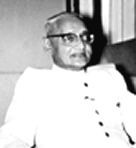Shahabuddin, Khwaja
Shahabuddin, Khwaja (1898-1977) politician and a diplomat, was born on 31 May 1898. Shahabuddin was the son of Khwaja Nizamuddin, a zamindar and also a commissioner of Dhaka Municipality. His maternal grandfather was Nawab Sir khwaja ahsanullah. He learnt Arabic, Persian, Urdu and English from a private tutor and also became a Hafiz-e-Quran. He married Farhat Banu, a daughter of Nawabzada khwaja atiqullah, in 1915.
Khwaja Shahabuddin acted as adviser to nawab habibullah, the son and successor of Nawab khwaja salimullah. He was a commissioner of Dhaka Municipality from 1918 to 1921. In 1921 he became a member of Dhaka District Board and was its chairman from 1923 to 1924. At that time he constructed the Dhaka-Narayanganj road. He was president of Dhaka District Muslim League (1928-1944), a member of the Executive council of the Governor of Bengal (1936) and the Treasurer of the Dhaka University (1930-1938).

Khwaja Shahabuddin was elected to the Bengal Legislative Assembly in 1937 from Narayanganj constituency and his wife, Farhat Banu was elected to the Assembly in the Muslim Women seat from Dhamrai. He was the Chief Whip of the government party from 1937 to 1941 when ak fazlul huq formed Ministry in Bengal. He was a Minister of Commerce, Labour and Industry of Bengal in the Muslim League government of khwaja nazimuddin (1943 to 1945). He took active part in the Pakistan movement and was the Chief Whip of Pakistan National Assembly in 1947. In 1948 he got the portfolios of the Ministries of Home affairs, Information and Broadcasting in the Central Government of Pakistan. In 1951 he was appointed governor of the North-West Frontier Province.
In 1954 he was Ambassador of Pakistan to Saudi Arabia with additional charge of Yemen. In 1958 he was Ambassador of Pakistan to Egypt. He was concurrently High Commissioner of Pakistan to Nigeria and Ambassador to Cameroon, Senegal, Togo and Sierra Leon from 1961 to 1964. In 1964 he led delegations to different countries with a mission to highlight Pakistan's attitude towards Kashmir. He led the Pakistan delegation to the International Seminar on Human Rights held in Kabul in the same year. From 1965 to 1969 he was the central Minister of Information and Broadcasting under Ayub Khan and was criticised by the Bengalis for imposing bar on the broadcasting of Tagore songs over Radio and Television. He died on Wednesday 9 February 1977 in Karachi at the age of 79 and was laid to rest in a public graveyard. [Mohammad Alamgir]
